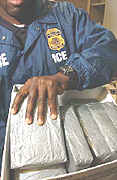
Search
Info Updates
National Threat Advisory
Elevated
![]()
Significant Risk of Terrorist Attacks
Report Suspicious Activity:
1-866-DHS-2-ICE1-866-347-2423
Information for families of ICE detainees:
Contact InformationFact Sheets
January 17, 2007
ICE COUNTER-NARCOTICS EFFORTS
 The resolve of the Department of Homeland Security's U.S. Immigration and Customs Enforcement (ICE) is to close down vulnerabilities that weaken our national security, expose our borders to infiltration, and subject our financial systems to exploitation. Drug smuggling is a direct threat to America 's border security, the laundering of drug proceeds through U.S. financial systems a direct threat to America 's economic security, and the violence and health problems associated with illegal drug activity pose direct threats to public security. For these reasons, a key priority of ICE is to investigate, disrupt, and dismantle global drug trafficking organizations.
The resolve of the Department of Homeland Security's U.S. Immigration and Customs Enforcement (ICE) is to close down vulnerabilities that weaken our national security, expose our borders to infiltration, and subject our financial systems to exploitation. Drug smuggling is a direct threat to America 's border security, the laundering of drug proceeds through U.S. financial systems a direct threat to America 's economic security, and the violence and health problems associated with illegal drug activity pose direct threats to public security. For these reasons, a key priority of ICE is to investigate, disrupt, and dismantle global drug trafficking organizations.
Combining information from the ICE Office of Intelligence, and the authorities and investigative strategies of the ICE Office of Investigations, ICE has seized more than 5,176,036 pounds of illegal narcotics since the agency was created on March 1, 2003. More importantly, ICE has helped reduce critical vulnerabilities in America's border and economic security by dismantling some of the world's most notorious criminal drug organizations in this short period of time.
Arrest and Extradition of ICE Fugitive Jhon Eidelbert Cano Correa from Colombia
On July 24, 2003, as the result of an ICE SAC New York investigation, Jhon Eidelbert Cano-Correa was indicted in the Eastern District of New York on money laundering and narcotics charges. On September 16, 2003, the government of Colombia issued a provisional warrant for Cano's arrest. Cano-Correa is a top-level member of Colombia 's Norte Valle Cartel and the U.S. Department of State offered up to $5 million for information leading to his arrest.
On October 29, 2005, members of the Colombian National Police (CNP) assigned to a Colombian Special Response Team arrested Cano-Correa in Antioquia , Colombia . A 30-man Colombian team, with four U.S. military helicopters from the CNP base in Santa Marta , Colombia , arrested CANO-Correa after a brief fire fight in which one Colombian SRT member was wounded. Cano-Correa was transported to Bogotá for processing before being transferred to a high security prison. The arrest was the result of information received by the CNP and coordinated with the ICE attaché in Bogotá and DEA/Bogotá. Cano-Correa remained in Colombian custody while his extradition was pending. On September 22, 2006, Cano-Correa was extradited from Bogotá , Colombia to New York City to face charges of narcotics distribution, smuggling, money laundering, and conspiracy.






